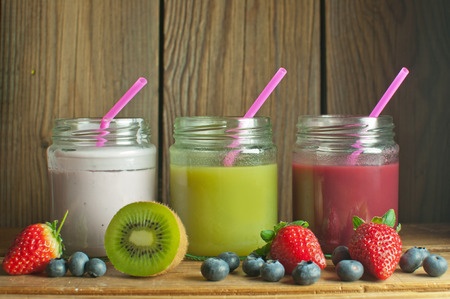Are smoothies healthy? Why smoothies get a lot of health hype, I prefer that my clients chew their food and eat fruits and vegetables. Here are some of the downsides of smoothies according to the British Heart Foundation:
Are Smoothies Healthy or Should I eat Whole Foods?
1. However much you drink, it won’t count as more than one of your 5-a-day.
According to new national recommendations, smoothies can count as no more than one of your 5-a-day – even if you’ve put 5 different fruit and veg in them. And if you have a glass of juice on the same day, you can’t count them both.
2. Having a massive smoothie for breakfast doesn’t mean you can just eat chips and cake for the rest of the day.
Healthy choices at one point in the day don’t cancel out the effects of salt, sugar and saturated fats in less healthy choices you have at other times – the idea is that they replace these foods or leave less room in the diet for them. Including fruit and veg in our diets throughout the day means there is more chance of that happening.
3. Smoothies are high in sugar.
If you blend fruit, the natural sugars are released from within the cell walls of the fruit and become “free sugars”. Free sugars include any added sugars (including honey and maple syrup) and are the kind we should all be cutting down on to protect our teeth as well as lower our energy intake to help maintain a healthy weight. Even if they have some added vegetables like spinach or kale, they are still likely to be high in sugar.
4. You can quickly have too much of a good thing.
According to the national Eatwell Guide, a serving of smoothie (or juice) is 150ml. That’s the same as a “mini” can of cola and less than half the size of a standard can of soft drink. It’s smaller than the little smoothie bottles you can buy and almost certainly a lot smaller than one you’d buy in a café. Remember, sharing is caring so split your smoothie with a friend or keep some for the next day if you are at home.
5. Drinking smoothies doesn’t mean you have a healthy, balanced diet.
We all need to eat more fruit and veg, and a 150ml portion of smoothie is one way to help you towards that, but it’s not the only thing to think about when it comes to eating well. We also need to eat high fiber and wholegrain carbohydrates, as well as some beans, pulses, fish, eggs, lean meat and other protein foods, as well as low fat dairy products and small amounts of healthier, unsaturated fats. To go with your breakfast smoothie, what about a poached egg on wholegrain toast, or ring the changes with a bowl of porridge topped with berries?
What’s the Science About Smoothies v. Whole Foods?
To answer the question of “Are smoothies healthy” let’s look at the scientific studies.
Surprisingly, even though the whole food we pop into the blender may have the same nutrients as the liquid smoothie, how those nutrients are absorbed can be affected by their form and structure.
• A 2019 paper published in the journal Food & Function describes how researchers tested the digestibility of three different forms of foods (solid, semisolid and liquid) that were identical in nutrient content. Then they measured how the varied forms of food affected appetite and specific blood tests in human subjects.
• Interestingly, scientists found that the liquid food caused a higher rise in triglycerides (a form of fat in the blood) than the solid food. The liquid food also caused less fullness and satisfaction (satiety) than the solid food.
• Other studies (cited in this same article) have found similar results. Ground nuts (peanut butter) have been shown to cause a higher rise in blood fat (triglycerides) than whole nuts, for example.
Why is this important?
• When excess triglycerides enter the circulation after a meal, it can trigger inflammation. In fact, these rises in blood fat after meals have been found to increase our risk for heart disease as well as Type 2 diabetes, say experts.
• These types of studies are intriguing, but they are also inconsistent because they are so difficult to study. And for people who rely on liquid nourishment for medical reasons, liquid meals can be convenient, even life-saving.
Still, it’s fascinating to learn that the form of the food we eat may have more impact than we think. Thanks for the question.
Click here for more answers to the question are smoothies healthy?






